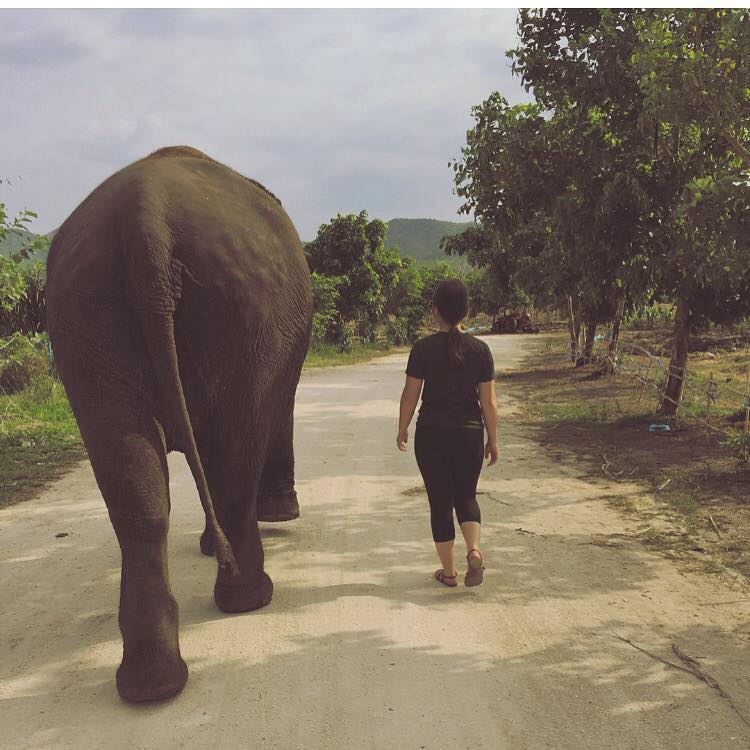Using one word, I would describe my experience as transformative. It’s been three weeks since returning home from our Southeast Asian Adventure, and the past few weeks have been quite reflective. I see the world differently and have a deeper appreciation of the basic luxuries that come with being an American citizen. America was built on the idea of equality among our diverse population. We have the right to debate politics and the opportunity to earn an education. Those examples stand out to me because of the stark differences between American and Asian culture in the countries we visited (Thailand, Cambodia and Myanmar). There is no right or wrong (or even a better or worse) culture; they are simply different.
Curious about a Thai person’s view on government affairs? You better not think to ask them their opinion because they could be punished for perceivably speaking against the Royal Family. However, in America, people seem to tell you their political views whether or not you want to hear them. How about earning a college degree? College education is a privilege, not a right. Our guide at ElephantsWorld, Dee, is in his mid-late twenties and is a Burmese refugee living in Thailand. He already has a wife and child. He is considered a lucky one because, if you think about it, all of his basic needs are cared for. He has food to eat, a safe place to live and loving people all around him. Although he has a productive, happy life you can’t help but think, “what if?” What if he had grown up in America? Would he have gotten an education? How different would his life have been if he could make choices based on what he wants to do rather than how to best survive? There just aren’t as many options.
Before visiting Cambodia, I was completely ignorant of the genocide that took place in the 70’s under the Khumer Rouge. The Khumer Rouge was a communist party led by Pol Pot. The goal of the Khumer Rouge was to return Cambodia into a classless, pure agrarian society. They destroyed anything with a Western influence as well as murdering the educated individuals in their own society. If you wore glasses, you were murdered. Glasses are considered a sign of education. When visiting Cambodia’s capital, Phnom Penh, our group learned about the horrific “Killing Fields” and S-21. We had audio tours describing the accounts of what happened at each of these locations. The torture that all Cambodians suffered during that time are indescribable. I am so grateful to have heard the stories because I now help by taking some of the responsibility of remembering these events. It is important to remember these times in history because we do not want them to be repeated.
While I was taking the audio tour at S-21, I stopped at a cell specified as “Chum Mey-Survivor,” and realized that there were (very few) people who actually survived this hell. While I looked around the room, I thought to myself, “Hm, I wonder what he’s doing with his life now.” I ended up meeting him 20 minutes later because he was selling his book near the exit! I still don’t understand how he could ever go back there. His wife and child died before his eyes at that site. I bought his book right away and learned that he feels it is his responsibility to tell others his story, so that we may all understand the depth of his pain and how many other Cambodians suffered in the same way. Nonetheless, those experiences made me more curious about the genocide. I just finished a book the other night called, “First They Killed My Father,” by Loung Ung. She was a young girl when her family of nine was forced to evacuate Phnom Penh in April 1975. Her book felt like the perfect supplement to our experiences and helped me learn more about what was going on during that time. Loung described family trips she dearly missed, such as a visit to the temples in the ancient city of Angkor Wat. It was really cool to know I had been in some of those same places. There are some photographs inside of the book that I recognized seeing during our own trip. Having some prior knowledge and experience before reading her specific account put into perspective that I was able to experience recent Cambodian history in person.
All in all, this trip was absolutely incredible. The value goes far beyond the financial aspect; it challenges you mentally, spiritually, and sometimes even physically! That last one applies to everyone who hiked the mountain at ElephantsWorld! No matter your major, I hope that every student will one day find the opportunity to experience studying abroad. Learn something new, make connections across the globe, and get out of your comfort zone.




